Unit 3 The Million Pound Bank Note Period Three Grammar & Writing 课件
文档属性
| 名称 | Unit 3 The Million Pound Bank Note Period Three Grammar & Writing 课件 |  | |
| 格式 | zip | ||
| 文件大小 | 1.2MB | ||
| 资源类型 | 教案 | ||
| 版本资源 | 人教版(新课程标准) | ||
| 科目 | 英语 | ||
| 更新时间 | 2018-03-25 11:26:58 | ||
图片预览

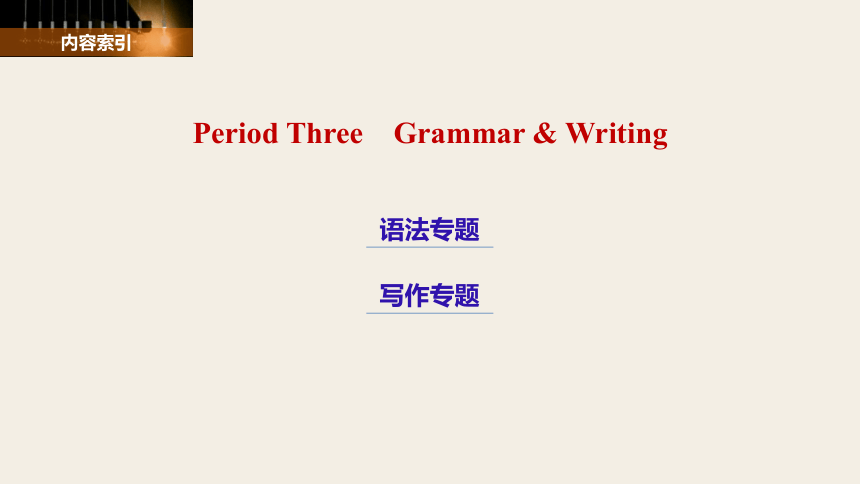

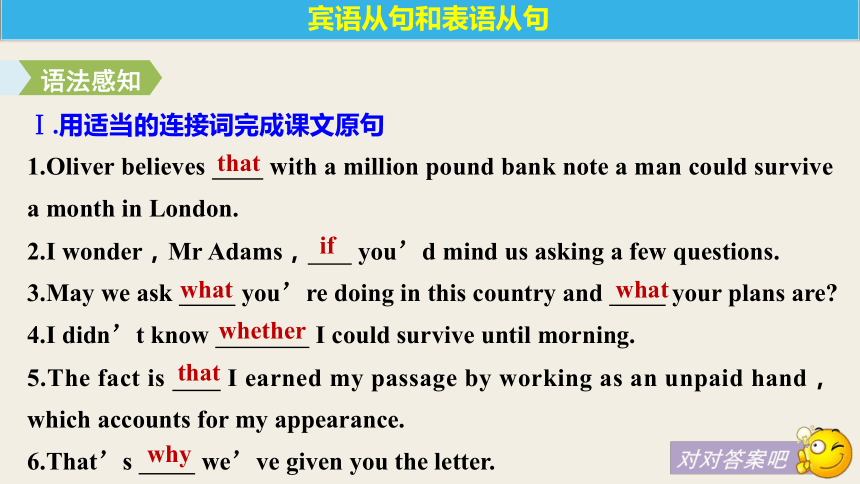
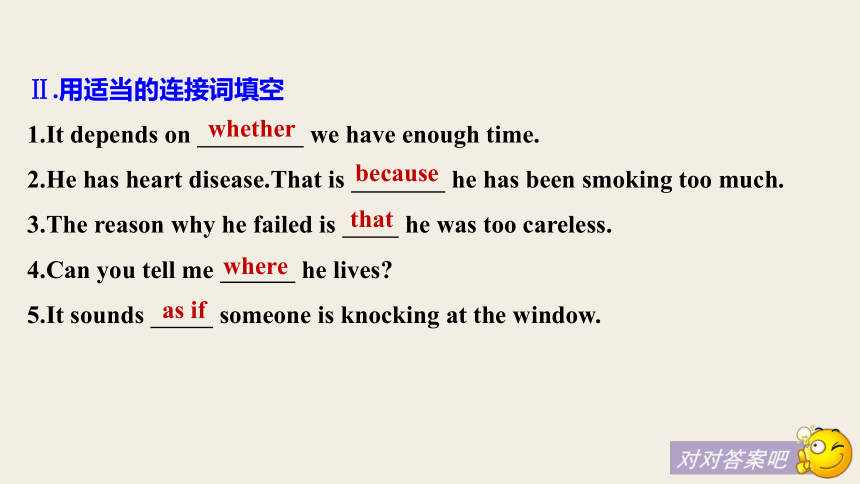
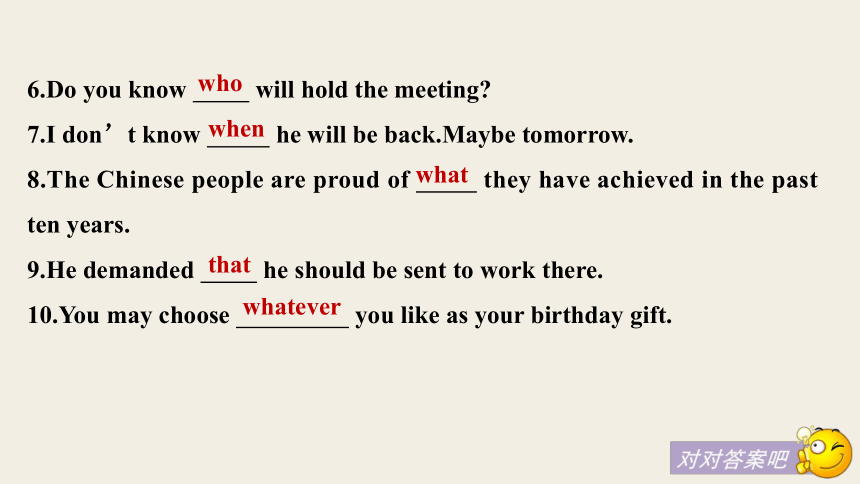
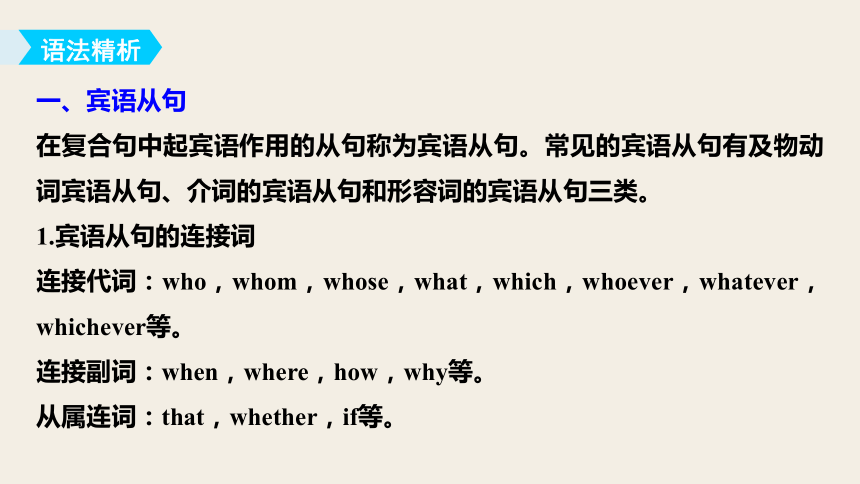
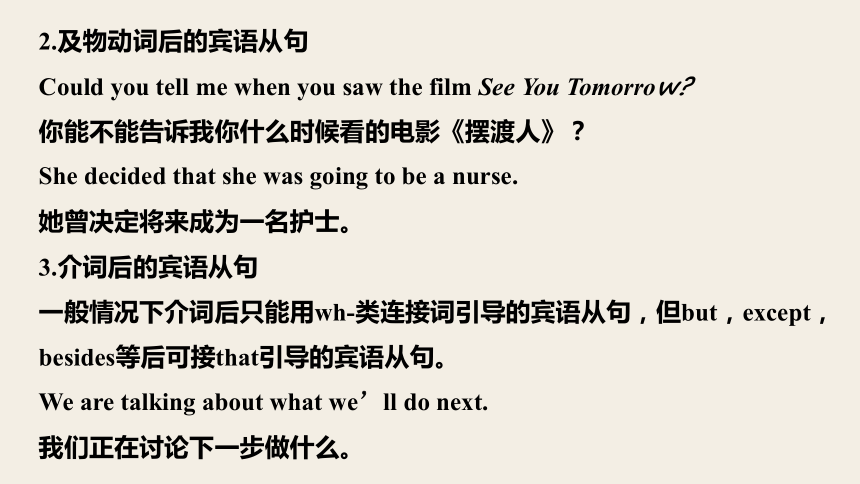
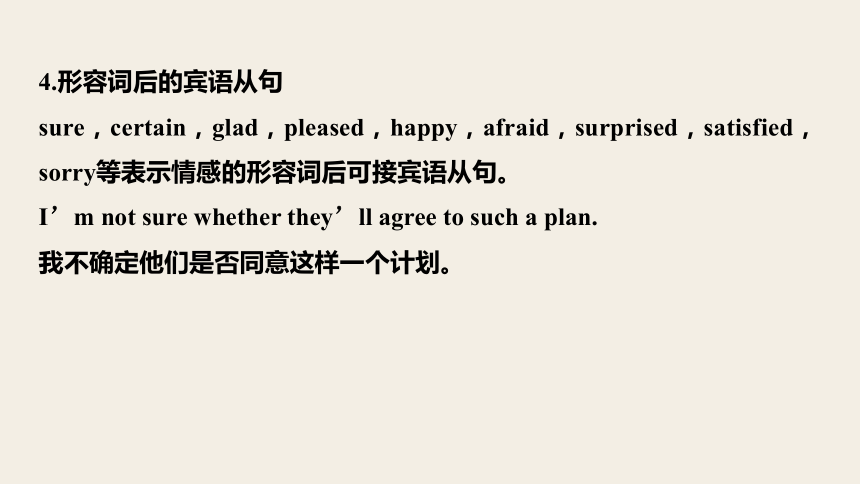
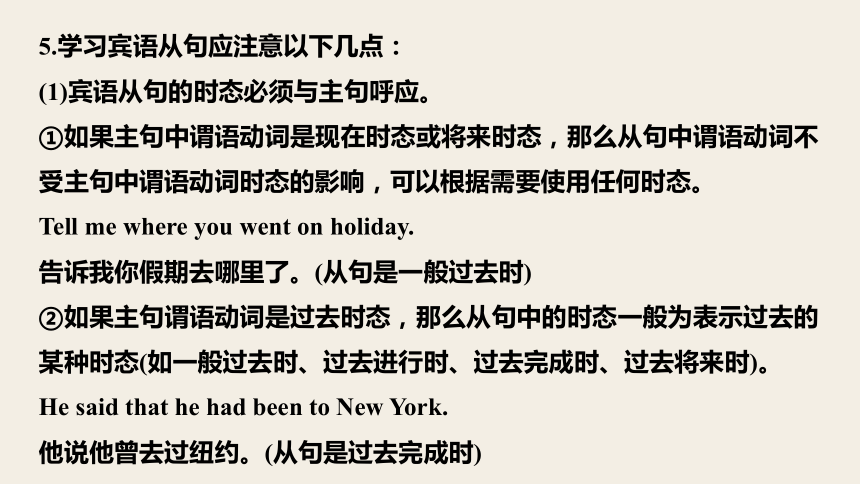
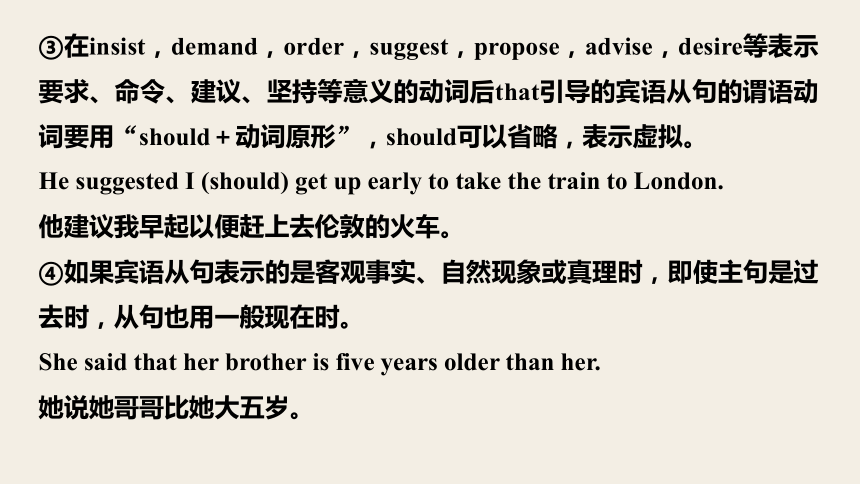
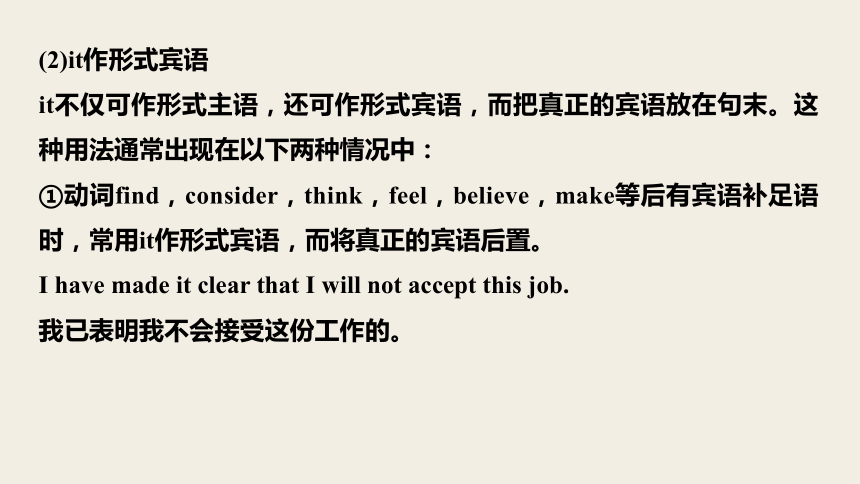
文档简介
课件40张PPT。Unit 3 The Million Pound Bank Note语法专题内容索引写作专题Period Three Grammar & Writing语法专题Ⅰ.用适当的连接词完成课文原句
1.Oliver believes with a million pound bank note a man could survive a month in London.
2.I wonder,Mr Adams, you’d mind us asking a few questions.
3.May we ask you’re doing in this country and your plans are?
4.I didn’t know I could survive until morning.
5.The fact is I earned my passage by working as an unpaid hand,which accounts for my appearance.
6.That’s we’ve given you the letter.宾语从句和表语从句thatifwhatwhatwhetherthatwhyⅡ.用适当的连接词填空
1.It depends on we have enough time.
2.He has heart disease.That is he has been smoking too much.
3.The reason why he failed is he was too careless.
4.Can you tell me he lives?
5.It sounds someone is knocking at the window.whetherbecausewherethatas if6.Do you know will hold the meeting?
7.I don’t know he will be back.Maybe tomorrow.
8.The Chinese people are proud of they have achieved in the past ten years.
9.He demanded he should be sent to work there.
10.You may choose you like as your birthday gift.whowhenthatwhatwhatever一、宾语从句
在复合句中起宾语作用的从句称为宾语从句。常见的宾语从句有及物动词宾语从句、介词的宾语从句和形容词的宾语从句三类。
1.宾语从句的连接词
连接代词:who,whom,whose,what,which,whoever,whatever,whichever等。
连接副词:when,where,how,why等。
从属连词:that,whether,if等。2.及物动词后的宾语从句
Could you tell me when you saw the film See You Tomorrow?
你能不能告诉我你什么时候看的电影《摆渡人》?
She decided that she was going to be a nurse.
她曾决定将来成为一名护士。
3.介词后的宾语从句
一般情况下介词后只能用wh-类连接词引导的宾语从句,但but,except,besides等后可接that引导的宾语从句。
We are talking about what we’ll do next.
我们正在讨论下一步做什么。4.形容词后的宾语从句
sure,certain,glad,pleased,happy,afraid,surprised,satisfied,sorry等表示情感的形容词后可接宾语从句。
I’m not sure whether they’ll agree to such a plan.
我不确定他们是否同意这样一个计划。5.学习宾语从句应注意以下几点:
(1)宾语从句的时态必须与主句呼应。
①如果主句中谓语动词是现在时态或将来时态,那么从句中谓语动词不受主句中谓语动词时态的影响,可以根据需要使用任何时态。
Tell me where you went on holiday.
告诉我你假期去哪里了。(从句是一般过去时)
②如果主句谓语动词是过去时态,那么从句中的时态一般为表示过去的某种时态(如一般过去时、过去进行时、过去完成时、过去将来时)。
He said that he had been to New York.
他说他曾去过纽约。(从句是过去完成时)③在insist,demand,order,suggest,propose,advise,desire等表示要求、命令、建议、坚持等意义的动词后that引导的宾语从句的谓语动词要用“should+动词原形”,should可以省略,表示虚拟。
He suggested I (should) get up early to take the train to London.
他建议我早起以便赶上去伦敦的火车。
④如果宾语从句表示的是客观事实、自然现象或真理时,即使主句是过去时,从句也用一般现在时。
She said that her brother is five years older than her.
她说她哥哥比她大五岁。(2)it作形式宾语
it不仅可作形式主语,还可作形式宾语,而把真正的宾语放在句末。这种用法通常出现在以下两种情况中:
①动词find,consider,think,feel,believe,make等后有宾语补足语时,常用it作形式宾语,而将真正的宾语后置。
I have made it clear that I will not accept this job.
我已表明我不会接受这份工作的。②有些动词(短语),如enjoy,love,like,hate,appreciate,take,hide,see to,insist on,depend on,rely on等带宾语从句时,习惯上在从句前加形式宾语it。
I hate it when people ask me for money.
我不喜欢别人向我借钱。(3)宾语从句中的否定转移
当主句谓语动词是think,consider,suppose,believe,expect,guess,imagine等表示“认为,相信,猜测等”的动词,主语是第一人称的一般现在时的句子时,习惯上把从句的否定词放在主句谓语前,但意义上否定的仍然是从句。
I don’t think he can finish the work on time.
我认为他无法按时完成工作。(4)动词后有两个或两个以上由that引导的宾语从句时,第一个that可省略,其余的that一般都不能省略。
I believe (that) you’ve done your best and that things will improve.
我相信你已经尽力了,一切都会好起来的。
(5)主句谓语和宾语从句之间有插入语时,宾语从句前的that不能省略。
He announced,believe it or not,that he would never forgive her.
他宣布,信不信由你,他决不会原谅她。whether和if引导宾语从句的区别:考点警示二、表语从句
在复合句中作表语的从句叫表语从句。表语从句位于主句中的连系动词之后。引导表语从句的连接词主要有:连接代词 who,whom,whose,what,which;连接副词when,where,how,why及从属连词that,whether,as if,because等。
1.that引导的表语从句
that仅起连接作用,无实际意义,在句中不作任何成分,通常不能省略。这种从句往往对主句主语的内容起进一步解释的作用。
其基本结构为“主语+系动词+that从句”。
The trouble is that we are short of funds.
困难是我们缺乏资金。2.wh-疑问词引导的表语从句
(1)连接代词what,which,who,whom,whose除在句子中起连接作用外,还可在从句中充当主语、宾语、表语、定语,且各有各的词义。
Xiao Li is no longer what he used to be.
小李不再是以前的样子了。(what在从句中作表语)
(2)连接副词when,where,how,why除在句中起连接作用外,在从句中还充当时间、地点、方式或原因状语,本身具有词义。
That is why he caught a cold yesterday.
那就是为什么他昨天得了感冒。(原因状语)(3)whether引导的表语从句连接词whether起连接作用,意为“是否”,在句中不作任何成分。
The problem is whether it is true.
问题是这是否是真的。3.从属连词as if,as though,because,as等引导的表语从句
because引导表语从句通常只用于“This/That/It is/was because...”结构中。as if/though引导的表语从句常置于系动词look,seem,sound,be,become等后面,常用虚拟语气,也可用陈述语气。
It is because he is too careless.
那是因为他太粗心了。
It looks as if it is going to snow.
看起来天要下雪。4.主语是表示建议、命令、要求、计划(suggestion,advice,order,request,proposal,plan)等的名词时,表语从句应该用虚拟语气,即“should+动词原形”,should可以省略。
My suggestion is that we (should) go and help him.
我的建议是我们应该去帮助他。5.学习表语从句应注意以下几点:
(1)当主语是the reason,the result或why引导的主语从句时,常用that引导表语从句,不用because。
The reason why I didn’t come is that I was ill yesterday.
我昨天没来是因为我生病了。
Why we decided to put off the football match was that the weather was too bad.
我们之所以决定推迟这场足球赛是因为天气太糟糕了。
(2)在引导表语从句时,whether不能用if替换。
His first question was whether Mr Smith had arrived.
他的第一个问题是史密斯先生到了没有。单句语法填空
(1)The doctor suggested that the operation (do) immediately.
(2)Why don’t you bring to his attention that you’re too ill to work on?
(3)She was worried about she passed the exam.
(4)I’m wondering you are always late for class.
(5)I am not sure or not he is willing to help me.题组训练(should) be doneitwhetherwhywhether(6)My parents are very kind to me and always let me do I think I should do.
(7)The trouble is I lost the key to my room.
(8)All this was over twenty years ago,but it is if it were only yesterday.
(9)I don’t suppose I shall be here until eight o’clock.
(10)He got up late.That was he was late for the meeting.what/whateverthatas thatwhy单句语法填空
1.Jane moved aimlessly down the tree-lined street,not knowing ______
she was heading.(2017·北京)
2.We choose this hotel because the price for a night here is down to $20,half of______ it used to charge.(2017·江苏)
3.She asked me _______ I had returned the books to the library,and I admitted that I hadn’t.(2017·天津)wherewhatwhether4.The most pleasant thing of the rainy season is one can be entirely free from dust.(2016·北京)
5.A ship in harbor is safe,but that’s not ships are built for.
(2015·安徽)
6.We must find out Karl is coming,so we can book a room for him.
(2015·重庆)
7.I truly believe beauty comes from within.(2015·北京)
8.If you swim in a river or lake,be sure to investigate is below the water surface.Often there are rocks or branches hidden in the water.
(2015·浙江)thatwhatwhenthatwhat 9.The exhibition tells us we should do something to stop air pollution.
(2015·四川)
10.—I wonder Mary has kept her figure after all these years.
—By working out every day.(2015·福建)
11.The best moment for the football star was he scored the winning goal.(2014·北京)
12.I’d appreciate if you could let me know in advance whether or not you will come.(2014·陕西)whyhowwhenit写作专题戏剧是文学体裁的一种,其基本要素包括戏剧冲突和戏剧语言。戏剧离不开冲突;戏剧语言包括人物语言和舞台说明。写好英语戏剧,应该注意以下几点:
1.确定剧情、故事梗概及主题。
2.确定剧中人物及其形象和性格特征(喜、怒、哀、乐、害羞、友好、慷慨、吝啬、恐惧以及勇敢等)。
3.确定故事发生的时间、地点及场景。
4.构思戏剧的矛盾冲突,事件的起因、发展、高潮和结局等。Creative writing:a scene for a play1.It/The story happened in/at...(地名) on/in...(日期)
2....(人名) is very kind/cruel/rich/generous/mean,but...
3.One fine day in spring...
4....(人名) is on the way to...
5.After several days...
6.The play is adapted from...根据下面的提示,编写一幕80词左右的英文戏剧,介绍亨利带着一张百万英镑的钞票去理发的过程:
亨利正走在大街上,看见了一家理发店,于是决定去理他的长头发。理发匠用粗鲁的态度接待了他,亨利坐在椅子上等待,理发匠问他是否付得起理发的费用。理发结束后,亨利出示了一张百万英镑的钞票,理发匠十分吃惊,并告诉他欢迎随时光临。Step One 审题谋篇
写作要求是根据提示写一幕戏剧。写作时应注意下面几点:
1.确定文体:这是一幕戏剧。写作时注意戏剧的写作特点。
2.主体时态:戏剧应以一般现在时为主。
3.主体人称:由于是写一幕关于亨利和理发店老板的戏剧,所以人称应该以第一人称和第二人称为主。写作步骤Step Two 联想词汇
1.沿着街道走
2.理发
3.用粗鲁的方式
4.为……付账
5.带着灿烂的笑容
6.送某人出门walk along/down the streethave one’s hair cutin a rude mannerpay for...wear a big smileshow sb.outStep Three 句式升级
1.亨利沿着街道走着,这时他看到了理发店的标志。
Henry is walking down the street and_________________________
________________.(and连接的并列句)
Henry is walking down the street ______________________________
_____.(when引导的状语从句)at that time he sees a sign for a barber’s shopwhen he sees a sign for a barber’sshop2.理发师看着亨利的头发,继续剪着另一个人的头发。
The barber looks at Henry’s hair and________________________
___________.(and连接的并列句)
The barber looks at Henry’s hair,__________________________
____________.(现在分词短语作状语)continues cutting anotherman’s haircontinuing cutting anotherman’s hair3.在给他理完发之后,理发师告诉亨利必须付多少钱。
,the barber tells him how much he must pay.(after引导的状语从句 )
,the barber tells him how much he must pay.(现在分词短语作状语)After Henry’s hair is cutHaving cut Henry’s hairStep Four 连句成篇(Henry is walking down the street when he sees a sign for a barber’s shop.He decides to have his hair cut.)
(H=Henry B=Barber)
H:Good afternoon.I’d like to have my hair cut,if I may.(The barber looks at Henry’s hair,continuing cutting another man’s hair.)Er,I’d really like a haircut.As you can see,it’s much too long.
B:(in a rude manner)Yes,I can see that.Indeed,I can.H:Fine,well,I’ll have a seat then.
(He sits in one of the chairs.The barber turns to look at Henry.)
B:It’s quite expensive here,you know!Are you sure you can pay for it?
H:Yes,I think so.
(Having cut Henry’s hair,the barber tells him how much he must pay.Henry shows the barber the million pound bank note.)
B:Why...,Mr....(looks shocked)
H:Adams.Henry Adams.I’m sorry,I don’t have any change.B:Oh,no,no.Please don’t worry!(wearing a big smile) Nothing to worry about!Nothing at all!Please come back whenever you like.It will be my honour to serve you!(showing Henry out with a bow)本课结束
1.Oliver believes with a million pound bank note a man could survive a month in London.
2.I wonder,Mr Adams, you’d mind us asking a few questions.
3.May we ask you’re doing in this country and your plans are?
4.I didn’t know I could survive until morning.
5.The fact is I earned my passage by working as an unpaid hand,which accounts for my appearance.
6.That’s we’ve given you the letter.宾语从句和表语从句thatifwhatwhatwhetherthatwhyⅡ.用适当的连接词填空
1.It depends on we have enough time.
2.He has heart disease.That is he has been smoking too much.
3.The reason why he failed is he was too careless.
4.Can you tell me he lives?
5.It sounds someone is knocking at the window.whetherbecausewherethatas if6.Do you know will hold the meeting?
7.I don’t know he will be back.Maybe tomorrow.
8.The Chinese people are proud of they have achieved in the past ten years.
9.He demanded he should be sent to work there.
10.You may choose you like as your birthday gift.whowhenthatwhatwhatever一、宾语从句
在复合句中起宾语作用的从句称为宾语从句。常见的宾语从句有及物动词宾语从句、介词的宾语从句和形容词的宾语从句三类。
1.宾语从句的连接词
连接代词:who,whom,whose,what,which,whoever,whatever,whichever等。
连接副词:when,where,how,why等。
从属连词:that,whether,if等。2.及物动词后的宾语从句
Could you tell me when you saw the film See You Tomorrow?
你能不能告诉我你什么时候看的电影《摆渡人》?
She decided that she was going to be a nurse.
她曾决定将来成为一名护士。
3.介词后的宾语从句
一般情况下介词后只能用wh-类连接词引导的宾语从句,但but,except,besides等后可接that引导的宾语从句。
We are talking about what we’ll do next.
我们正在讨论下一步做什么。4.形容词后的宾语从句
sure,certain,glad,pleased,happy,afraid,surprised,satisfied,sorry等表示情感的形容词后可接宾语从句。
I’m not sure whether they’ll agree to such a plan.
我不确定他们是否同意这样一个计划。5.学习宾语从句应注意以下几点:
(1)宾语从句的时态必须与主句呼应。
①如果主句中谓语动词是现在时态或将来时态,那么从句中谓语动词不受主句中谓语动词时态的影响,可以根据需要使用任何时态。
Tell me where you went on holiday.
告诉我你假期去哪里了。(从句是一般过去时)
②如果主句谓语动词是过去时态,那么从句中的时态一般为表示过去的某种时态(如一般过去时、过去进行时、过去完成时、过去将来时)。
He said that he had been to New York.
他说他曾去过纽约。(从句是过去完成时)③在insist,demand,order,suggest,propose,advise,desire等表示要求、命令、建议、坚持等意义的动词后that引导的宾语从句的谓语动词要用“should+动词原形”,should可以省略,表示虚拟。
He suggested I (should) get up early to take the train to London.
他建议我早起以便赶上去伦敦的火车。
④如果宾语从句表示的是客观事实、自然现象或真理时,即使主句是过去时,从句也用一般现在时。
She said that her brother is five years older than her.
她说她哥哥比她大五岁。(2)it作形式宾语
it不仅可作形式主语,还可作形式宾语,而把真正的宾语放在句末。这种用法通常出现在以下两种情况中:
①动词find,consider,think,feel,believe,make等后有宾语补足语时,常用it作形式宾语,而将真正的宾语后置。
I have made it clear that I will not accept this job.
我已表明我不会接受这份工作的。②有些动词(短语),如enjoy,love,like,hate,appreciate,take,hide,see to,insist on,depend on,rely on等带宾语从句时,习惯上在从句前加形式宾语it。
I hate it when people ask me for money.
我不喜欢别人向我借钱。(3)宾语从句中的否定转移
当主句谓语动词是think,consider,suppose,believe,expect,guess,imagine等表示“认为,相信,猜测等”的动词,主语是第一人称的一般现在时的句子时,习惯上把从句的否定词放在主句谓语前,但意义上否定的仍然是从句。
I don’t think he can finish the work on time.
我认为他无法按时完成工作。(4)动词后有两个或两个以上由that引导的宾语从句时,第一个that可省略,其余的that一般都不能省略。
I believe (that) you’ve done your best and that things will improve.
我相信你已经尽力了,一切都会好起来的。
(5)主句谓语和宾语从句之间有插入语时,宾语从句前的that不能省略。
He announced,believe it or not,that he would never forgive her.
他宣布,信不信由你,他决不会原谅她。whether和if引导宾语从句的区别:考点警示二、表语从句
在复合句中作表语的从句叫表语从句。表语从句位于主句中的连系动词之后。引导表语从句的连接词主要有:连接代词 who,whom,whose,what,which;连接副词when,where,how,why及从属连词that,whether,as if,because等。
1.that引导的表语从句
that仅起连接作用,无实际意义,在句中不作任何成分,通常不能省略。这种从句往往对主句主语的内容起进一步解释的作用。
其基本结构为“主语+系动词+that从句”。
The trouble is that we are short of funds.
困难是我们缺乏资金。2.wh-疑问词引导的表语从句
(1)连接代词what,which,who,whom,whose除在句子中起连接作用外,还可在从句中充当主语、宾语、表语、定语,且各有各的词义。
Xiao Li is no longer what he used to be.
小李不再是以前的样子了。(what在从句中作表语)
(2)连接副词when,where,how,why除在句中起连接作用外,在从句中还充当时间、地点、方式或原因状语,本身具有词义。
That is why he caught a cold yesterday.
那就是为什么他昨天得了感冒。(原因状语)(3)whether引导的表语从句连接词whether起连接作用,意为“是否”,在句中不作任何成分。
The problem is whether it is true.
问题是这是否是真的。3.从属连词as if,as though,because,as等引导的表语从句
because引导表语从句通常只用于“This/That/It is/was because...”结构中。as if/though引导的表语从句常置于系动词look,seem,sound,be,become等后面,常用虚拟语气,也可用陈述语气。
It is because he is too careless.
那是因为他太粗心了。
It looks as if it is going to snow.
看起来天要下雪。4.主语是表示建议、命令、要求、计划(suggestion,advice,order,request,proposal,plan)等的名词时,表语从句应该用虚拟语气,即“should+动词原形”,should可以省略。
My suggestion is that we (should) go and help him.
我的建议是我们应该去帮助他。5.学习表语从句应注意以下几点:
(1)当主语是the reason,the result或why引导的主语从句时,常用that引导表语从句,不用because。
The reason why I didn’t come is that I was ill yesterday.
我昨天没来是因为我生病了。
Why we decided to put off the football match was that the weather was too bad.
我们之所以决定推迟这场足球赛是因为天气太糟糕了。
(2)在引导表语从句时,whether不能用if替换。
His first question was whether Mr Smith had arrived.
他的第一个问题是史密斯先生到了没有。单句语法填空
(1)The doctor suggested that the operation (do) immediately.
(2)Why don’t you bring to his attention that you’re too ill to work on?
(3)She was worried about she passed the exam.
(4)I’m wondering you are always late for class.
(5)I am not sure or not he is willing to help me.题组训练(should) be doneitwhetherwhywhether(6)My parents are very kind to me and always let me do I think I should do.
(7)The trouble is I lost the key to my room.
(8)All this was over twenty years ago,but it is if it were only yesterday.
(9)I don’t suppose I shall be here until eight o’clock.
(10)He got up late.That was he was late for the meeting.what/whateverthatas thatwhy单句语法填空
1.Jane moved aimlessly down the tree-lined street,not knowing ______
she was heading.(2017·北京)
2.We choose this hotel because the price for a night here is down to $20,half of______ it used to charge.(2017·江苏)
3.She asked me _______ I had returned the books to the library,and I admitted that I hadn’t.(2017·天津)wherewhatwhether4.The most pleasant thing of the rainy season is one can be entirely free from dust.(2016·北京)
5.A ship in harbor is safe,but that’s not ships are built for.
(2015·安徽)
6.We must find out Karl is coming,so we can book a room for him.
(2015·重庆)
7.I truly believe beauty comes from within.(2015·北京)
8.If you swim in a river or lake,be sure to investigate is below the water surface.Often there are rocks or branches hidden in the water.
(2015·浙江)thatwhatwhenthatwhat 9.The exhibition tells us we should do something to stop air pollution.
(2015·四川)
10.—I wonder Mary has kept her figure after all these years.
—By working out every day.(2015·福建)
11.The best moment for the football star was he scored the winning goal.(2014·北京)
12.I’d appreciate if you could let me know in advance whether or not you will come.(2014·陕西)whyhowwhenit写作专题戏剧是文学体裁的一种,其基本要素包括戏剧冲突和戏剧语言。戏剧离不开冲突;戏剧语言包括人物语言和舞台说明。写好英语戏剧,应该注意以下几点:
1.确定剧情、故事梗概及主题。
2.确定剧中人物及其形象和性格特征(喜、怒、哀、乐、害羞、友好、慷慨、吝啬、恐惧以及勇敢等)。
3.确定故事发生的时间、地点及场景。
4.构思戏剧的矛盾冲突,事件的起因、发展、高潮和结局等。Creative writing:a scene for a play1.It/The story happened in/at...(地名) on/in...(日期)
2....(人名) is very kind/cruel/rich/generous/mean,but...
3.One fine day in spring...
4....(人名) is on the way to...
5.After several days...
6.The play is adapted from...根据下面的提示,编写一幕80词左右的英文戏剧,介绍亨利带着一张百万英镑的钞票去理发的过程:
亨利正走在大街上,看见了一家理发店,于是决定去理他的长头发。理发匠用粗鲁的态度接待了他,亨利坐在椅子上等待,理发匠问他是否付得起理发的费用。理发结束后,亨利出示了一张百万英镑的钞票,理发匠十分吃惊,并告诉他欢迎随时光临。Step One 审题谋篇
写作要求是根据提示写一幕戏剧。写作时应注意下面几点:
1.确定文体:这是一幕戏剧。写作时注意戏剧的写作特点。
2.主体时态:戏剧应以一般现在时为主。
3.主体人称:由于是写一幕关于亨利和理发店老板的戏剧,所以人称应该以第一人称和第二人称为主。写作步骤Step Two 联想词汇
1.沿着街道走
2.理发
3.用粗鲁的方式
4.为……付账
5.带着灿烂的笑容
6.送某人出门walk along/down the streethave one’s hair cutin a rude mannerpay for...wear a big smileshow sb.outStep Three 句式升级
1.亨利沿着街道走着,这时他看到了理发店的标志。
Henry is walking down the street and_________________________
________________.(and连接的并列句)
Henry is walking down the street ______________________________
_____.(when引导的状语从句)at that time he sees a sign for a barber’s shopwhen he sees a sign for a barber’sshop2.理发师看着亨利的头发,继续剪着另一个人的头发。
The barber looks at Henry’s hair and________________________
___________.(and连接的并列句)
The barber looks at Henry’s hair,__________________________
____________.(现在分词短语作状语)continues cutting anotherman’s haircontinuing cutting anotherman’s hair3.在给他理完发之后,理发师告诉亨利必须付多少钱。
,the barber tells him how much he must pay.(after引导的状语从句 )
,the barber tells him how much he must pay.(现在分词短语作状语)After Henry’s hair is cutHaving cut Henry’s hairStep Four 连句成篇(Henry is walking down the street when he sees a sign for a barber’s shop.He decides to have his hair cut.)
(H=Henry B=Barber)
H:Good afternoon.I’d like to have my hair cut,if I may.(The barber looks at Henry’s hair,continuing cutting another man’s hair.)Er,I’d really like a haircut.As you can see,it’s much too long.
B:(in a rude manner)Yes,I can see that.Indeed,I can.H:Fine,well,I’ll have a seat then.
(He sits in one of the chairs.The barber turns to look at Henry.)
B:It’s quite expensive here,you know!Are you sure you can pay for it?
H:Yes,I think so.
(Having cut Henry’s hair,the barber tells him how much he must pay.Henry shows the barber the million pound bank note.)
B:Why...,Mr....(looks shocked)
H:Adams.Henry Adams.I’m sorry,I don’t have any change.B:Oh,no,no.Please don’t worry!(wearing a big smile) Nothing to worry about!Nothing at all!Please come back whenever you like.It will be my honour to serve you!(showing Henry out with a bow)本课结束
同课章节目录
